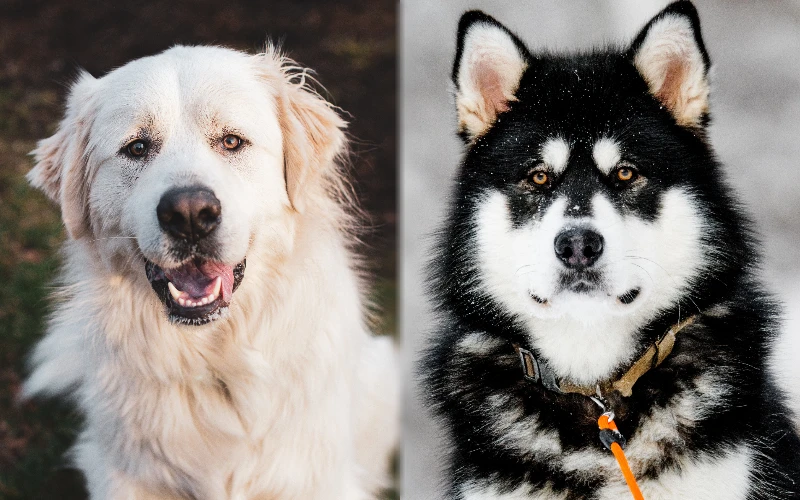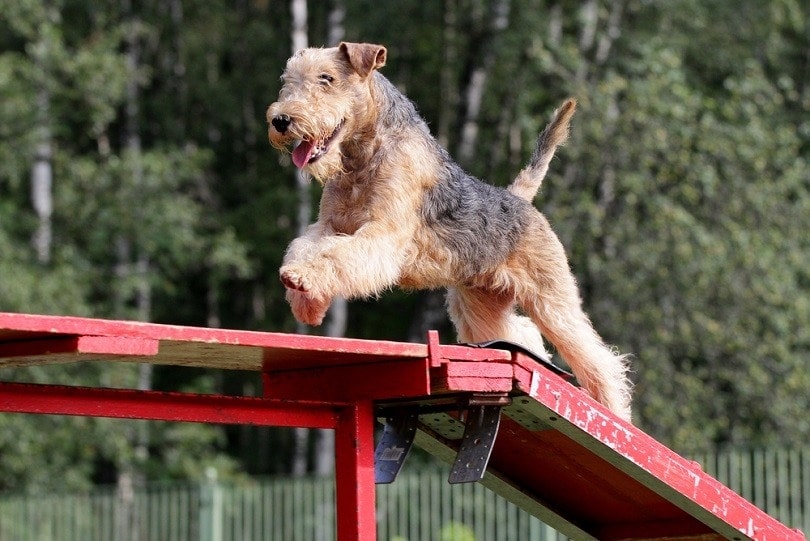Golden Retriever Dog Breed Info: Pictures, Personality & Facts

Updated on
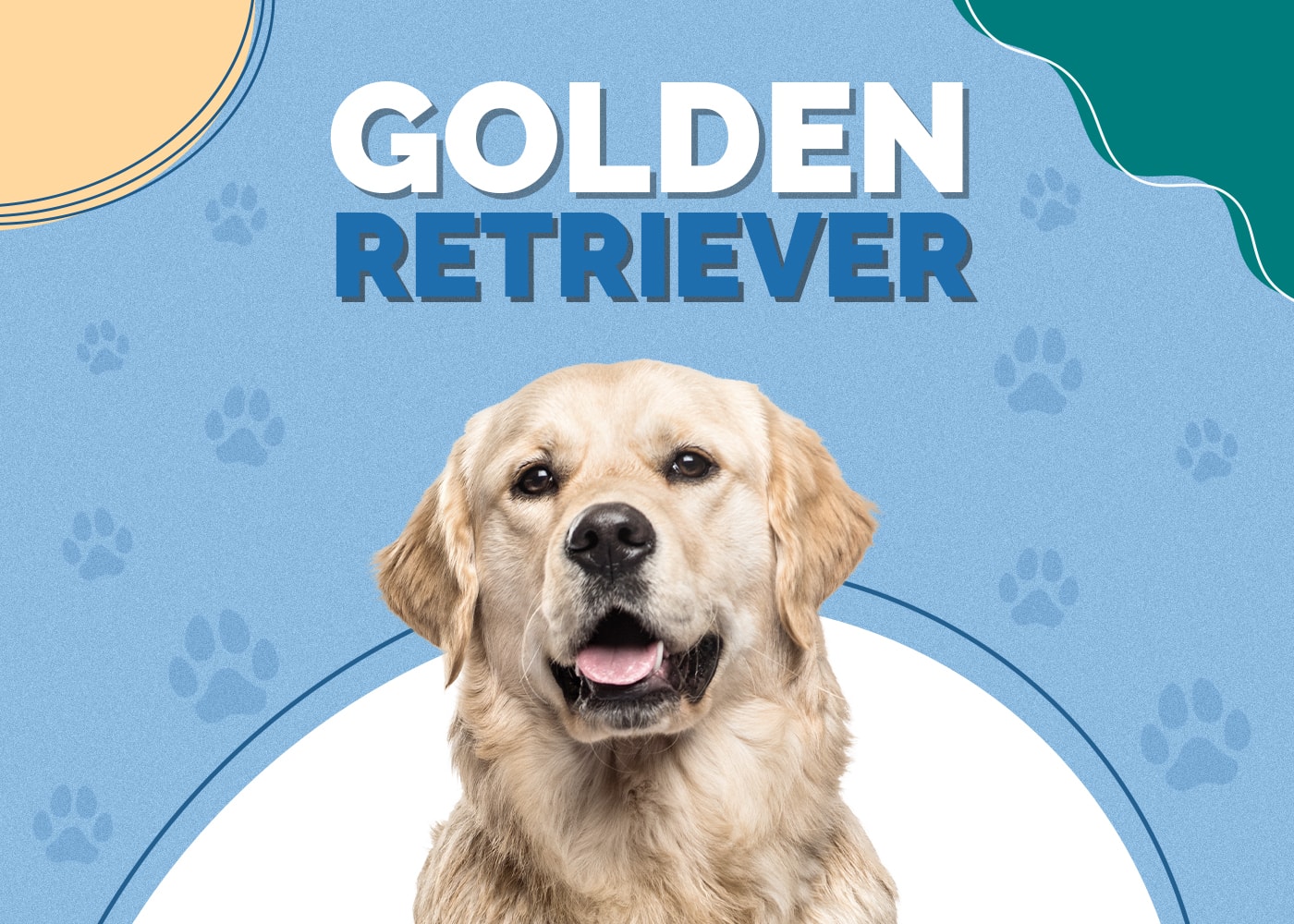
| Height: | 20 – 24 inches |
| Weight: | 55 – 70 pounds |
| Lifespan: | 10 – 12 years |
| Colors: | Fawn, cream |
| Suitable for: | Active families, those looking for the classic all-American dog |
| Temperament: | Affectionate, mild-mannered, easy to train, obedient, high-energy |
When you imagine the classic dog, there’s a good chance that you’re picturing a Golden Retriever. These animals have been at the top of just about every “most popular dog” list for decades, and it’s not hard to see why: They’re loyal, loving, and gentle, making them the ideal family pet.
While everyone is familiar with Golden Retrievers, many people likely believe that they know more about this breed than they actually do. These dogs are wonderful, but they’re not perfect, and they have quite a few challenges that are specific to the breed.
That said, they’re still great dogs, and they’d make a fantastic addition to your household. If you’d like to learn more about these amazing pups, the guide below will walk you through everything you need to know about Golden Retrievers.
 Golden Retriever Puppies
Golden Retriever Puppies

There’s nothing as cute as a Golden Retriever puppy. They’re little yellow balls of fluff that never stop moving and playing, and they’ll melt your heart from the first moment you lay eyes on them.
However, that’s a double-edged sword. There are many people who fell in love with one of those little fluffballs, only to discover that they grow up into dogs that are just as active and energetic. Simply put, Goldens aren’t a great fit for sedentary families.
That’s especially true if you have expensive furniture and not much time for games of fetch. If not properly exercised, these pups can channel their prodigious energy into turning your home inside out.
However, if you believe that you’re capable of keeping up with one of these dogs, you’ll enjoy every minute you spend with them. They’re incredibly loving and loyal, and they get along with just about everyone they come across, regardless of species.
3 Little-Known Facts About the Golden Retriever
1. Goldens are often used as search and rescue dogs.
Golden Retrievers were bred as hunting dogs, and their job was to track down any fallen prey and bring it back to their masters. As a result, they need formidable senses of smell and an obedient nature.
Those traits make them excellent search-and-rescue animals. They can locate a missing person in no time, and they will follow their handler’s instructions to the letter.
Or you can just train them to help you find the remote — your call.
2. They’re great at watching your stuff but not so great at protecting it.
Goldens have a keen eye for danger and a sixth sense for knowing when someone’s up to no good, and they’re not afraid to raise the alarm. If your Golden is barking in the middle of the night, there’s a good chance that something’s wrong.
Now, that does not mean they’ll charge downstairs and run the bad guys off. After all, that’s what they have you for.
3. They’re popular around the world.
There’s no doubt that they’re one of the most popular breeds in the United States — they’ve seldom, if ever, fallen out of the top five most-owned breeds in America.
However, they’re equally popular in many other countries around the world, especially Australia, the U.K., and Brazil. Their friendly disposition, eagerness to learn, and tireless work ethic make them the perfect job for just about any environment.

A Brief History of Golden Retrievers
Despite being known as an all-American breed, these dogs actually originated in Scotland in the mid-19th century. Bird hunting was popular at the time, but there was one problem: There is a lot of water in Scotland, and the dogs at the time were poorly equipped to go swimming for fallen prey.
To remedy this problem, breeders crossed the best retrievers they had available with the best water spaniels. The result was a medium- to large-sized dog with a double coat that absolutely loved to swim.
Soon, however, hunters had another problem on their hands: Their new guns were effective at a much longer range than before, meaning there was a greater distance between them and their fallen birds. This led breeders to focus on two traits that Goldens would become famous for: their powerful snouts and their tawny coats.
An emphasis was placed on these dogs being able to sniff out fallen birds from great distances, which is why Goldens are such talented scent hounds. Their golden coat was also important, as it allowed them to stand out among the brush, making it much less likely they’d be the victims of friendly fire.
While they’re still used as hunting dogs today, Golden Retrievers are much more commonly kept as family pets. Still, they love to have a job to do, and they can sniff out just about anything, which is why it’s futile to try to hide cookies from them.
 Temperament & Intelligence of the Golden Retriever 🧠
Temperament & Intelligence of the Golden Retriever 🧠
According to some estimates, the Golden Retriever is the fourth-smartest dog breed on the planet, trailing only Border Collies, Poodles, and German Shepherds. This intelligence makes them extremely easy to train.
However, it also ensures that they get bored easily. As a result, you need to stimulate both their bodies and minds in order to prevent problematic behaviors like digging or destructive chewing. These dogs don’t like to behave badly, but if you don’t burn off their excess energy, they have no choice.
Regardless of how much fuel they have, Goldens are sweet, good-natured dogs that have never met a stranger. They love affection, but not as much as they enjoy a spirited game of fetch, so don’t take it personally if they ignore your petting while imploring you to throw the tennis ball just one more time.
That doesn’t mean that they don’t value family time, however; rather, they treasure it. Once you’re done tuckering out your Golden, don’t be surprised if they follow you from room to room, waiting for you to settle so they can lay at your feet.
They’re not prone to aggression, as that was long ago considered unworthy of the breed and bred out of them. Instead, they’re incredibly eager to please, which makes them great around people but unfortunately, leaves them susceptible to abuse.
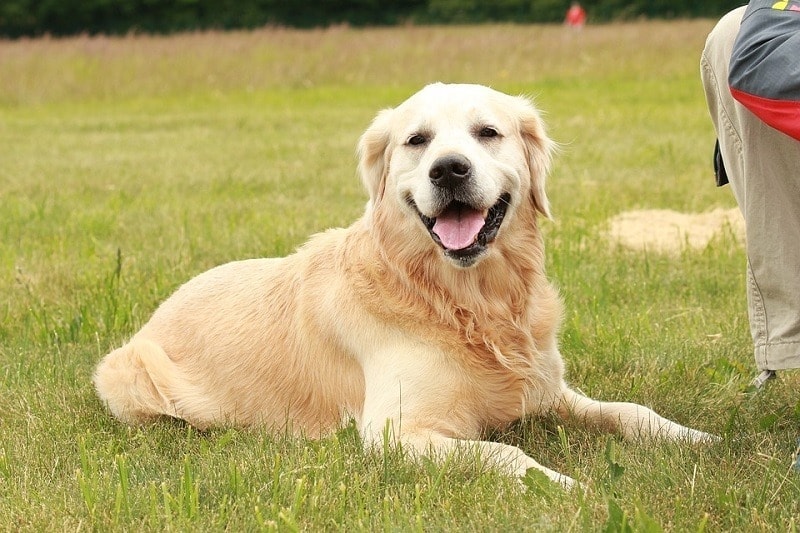
Are These Dogs Good for Families? 🏡
Golden Retrievers are one of the best family dogs that you can possibly bring home. They’re patient, gentle, and not prone to aggression, so they’re safe around just about any member of the family.
However, you should watch them around small children. These dogs tend to view little children as littermates and will play with them like littermates as well. That means roughhousing can get out of hand if you’re not careful, so you’ll need to be there to make sure they don’t knock your toddler over.
Also, just because they’re good with families, that doesn’t mean they’ll be a good fit in every family. If your brood enjoys spending all their free time in front of a screen, then a Golden Retriever will most likely be a nuisance. They need far too much exercise to enjoy watching you make your way through another YouTube playlist.
That makes them a poor fit for owners with limited mobility (unless they make arrangements for someone else to tucker the dog out). If you’re not capable of taking your dog for lengthy walks, then you’ll need to figure something else out. At the very least, you’ll need to be able to fling a tennis ball over and over again.
As you might expect, Goldens aren’t great apartment dogs. They need a great deal of room to move around. That’s not to say that you can’t have one in an apartment, but you’ll need to be deliberate about giving them a ton of exercise every day (and you’ll likely need to hire a dog walker while you’re at work too).
Does This Breed Get Along With Other Pets? 🐶 😽
Golden Retrievers usually get along famously with other dogs, especially as puppies. These dogs have boundless energy, so they need all the playmates they can get.
As they mature, though, they become much more focused on playing games — mainly fetch — with their owners. As a result, they may ignore other dogs in the household. This can be extremely frustrating for any other mutts that want another canine playmate.
They’re usually tolerant of other animals as well, but it’s always better if they’re raised with them as puppies rather than introducing them into the house later in life.
One thing to be aware of, however, is that Goldens can be prone to resource guarding. As a result, you may want to keep their toys separate from those of other animals in the house, just to prevent a misunderstanding.

 Things to Know When Owning a Golden Retriever
Things to Know When Owning a Golden Retriever
Other than their massive exercise requirements, Golden Retrievers are fairly easy dogs to have around, making them a fantastic choice for first-time owners. However, there are still a few things that you should be aware of before adding one to your pack.
Food & Diet Requirements 🦴
Whenever you have a dog as active as a Golden Retriever, you’re going to need to make sure they run on premium fuel. These pups have boundless energy, but that doesn’t give you an excuse to feed them low-grade kibble.
Instead, look for something with plenty of protein, as well as high-quality fruits and vegetables. Any food that has plenty of omega fatty acids (found in ingredients like fish and flaxseed) is good, as well as one with plenty of glucosamine and chondroitin.
The primary ingredients that you want to avoid are animal by-products, as these are made with low-grade meat. Also, beware of wheat, corn, soy, and other cheap fillers; these can cause upset stomachs, and they offer almost nothing beyond empty calories.
In terms of how much to feed these dogs, we recommend following the instructions given by the manufacturer of your kibble. We generally don’t encourage allowing them to free-feed, as they can overeat, especially when bored. That’s a recipe for a fat dog, and fat dogs have all sorts of health issues.
Go easy on human food and treats too. While those things are fine on special occasions, a little bit goes a long way. You don’t need to use food as a training reward with Goldens either — your praise is payment enough.

Exercise 🐕
As you might expect, exercise is a big deal with Goldens. They have a ton of energy, and you need to wring it out of them — or else your furniture or shoes could pay the price.
The good news is that it takes little encouragement to get these dogs to run around. They especially love to play fetch, so if you have a big backyard, a tennis ball, and at least one functioning rotator cuff, you should be good to go.
Be careful pushing them too hard, though, especially during strenuous activities like fetch or agility training. These dogs don’t know when to quit, and you could easily overexert them. That’s especially true when they’re puppies, as their growth plates aren’t fully developed and are especially vulnerable.
If possible, take your Golden swimming at every opportunity. These dogs adore the water, and swimming is a fantastic low-impact exercise.
Given how obedient Goldens are, they’re naturals at obedience competitions and agility drills, both of which are great ways to tax their minds as much as their bodies. Again, just don’t push them too hard, especially as puppies.
Training 🦮
Training a Golden is important, even though they’re typically well-behaved by nature. You should start when they’re puppies, and proper socialization is every bit as important as obedience work.
Fortunately, these dogs love to learn and they’re true people-pleasers. As a result, you can pretty much teach a Golden to do anything you want them to do, and it won’t take a ton of effort to make them understand.
The way that you train them is important, though. These are sensitive animals, and they don’t respond well to harsh training methods. So, skip the shock collar and angry shouting, and lavish them with praise and affection when they behave instead.
While they’re extremely active dogs, they can also be trained to lay still for hours at a time; after all, that’s the behavior that would be expected of them in a hunting blind. This makes crate training a breeze and enables you to give yourself a respite from your hyperactive dog whenever you need it.
You should take time out of every week (or every day, preferably) to give your dog a vigorous training session. Group classes are also a good idea, as they’ll allow your dog to learn in a new environment, which increases mental stimulation.
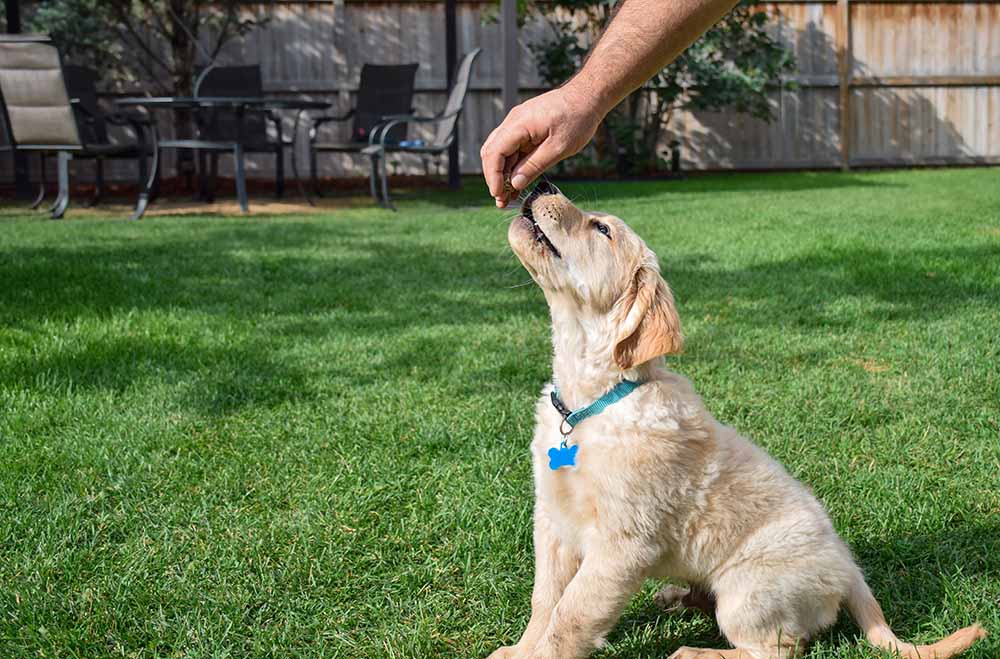
Grooming ✂️
It may seem like any time that you’re not exercising your Golden, you’re brushing them. These dogs shed frequently, and you’ll need to stay on top of it if you don’t want your whole house to be swimming in dog hair.
In fact, unless you have a great deal of free time on your hands, you’re most likely better off just setting up a regular appointment with a groomer than trying to do everything yourself. You’ll still need to brush them for maintenance purposes, of course, but it will cut down on the amount of grunt work you need to do.
Regardless of how often you brush them (or pay to have them brushed), you’ll still have golden fur all over everything. It’s just the price you pay to own one of these dogs.
Their nails should be trimmed regularly, although they may file them down themselves if they’re active enough. You’ll also need to clean their ears regularly to prevent infections, and brush their teeth at least a few times a week.
They only need to be bathed a few times a year unless they get dirty; however, they will most likely get dirty often, especially if you let them swim regularly. They love baths, though, so that’s not going to be a punishment for them. Just make sure you use a high-quality dog shampoo!
Health and Conditions ❤️
If you want a purebred Golden Retriever, then you’re going to increase the risk that your dog will suffer from certain ailments. These dogs are predisposed to several conditions, and it’s unlikely you’ll get through the pup’s entire life without encountering at least one of the issues below.
- Entropion
- Allergies
- Trichiasis
- Osteochondritis dissecans
- Sebaceous adenitis
- Acute moist dermatitis
- Cancer
- Hip dysplasia
- Elbow dysplasia
- Heart disease
- Subvalvular aortic stenosis
- Patellar luxation
- Cataracts
 Male vs. Female
Male vs. Female
On average, a male Golden Retriever will be a bit larger than a female, although the difference isn’t significant. Think about 2 inches in height and maybe 10 pounds of heft, at the most.
Males tend to be a bit more clingy. They’ll follow you to the ends of the Earth, demanding attention every step of the way. Females expect you to come to them. You’ll get plenty of affection from either one, though.
The ladies tend to mature more quickly, which makes them easier to train — at first. Once the boys catch up, they usually surpass them because they’re so eager to please.
Females tend to be more territorial as well, especially if there is another female present. Goldens usually tolerate other dogs well, regardless of species or gender, but if there’s a problem, it’s likely to be between two females.
 Conclusion
Conclusion
If you want a dog that’s incredibly smart, loyal, and a pleasure to have around, you can’t go wrong with the classic Golden Retriever (though there are other varieties). There’s a reason that these dogs have been so popular for so long, and you’ll understand why if you bring one home.
Don’t assume it will be all rainbows and sunshine, though. These pooches need a ton of exercise, and they can become destructive if they don’t get it. They also have a variety of health issues that you need to be aware of.
At the end of the day, though, it’s hard to beat the company of a Golden Retriever.
See also:
- 10 Best Pet Insurance Providers for Golden Retrievers – Reviews & Top Picks
- Can Golden Retrievers Live in Apartments? Breed Needs & Care Tips
Featured Image Credit: Olena Brodetska, Shutterstock
 Golden Retriever Puppies
Golden Retriever Puppies
 Temperament & Intelligence of the Golden Retriever 🧠
Temperament & Intelligence of the Golden Retriever 🧠 Things to Know When Owning a Golden Retriever
Things to Know When Owning a Golden Retriever Male vs. Female
Male vs. Female